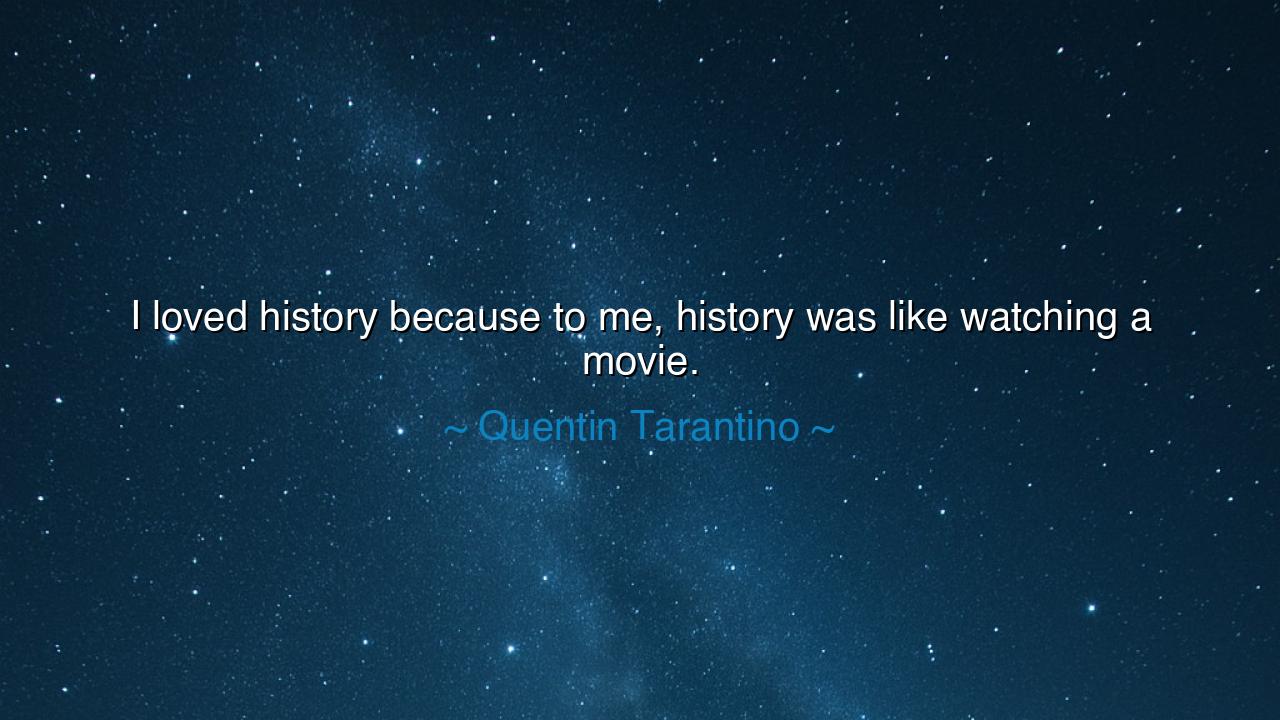
I loved history because to me, history was like watching a movie.






Hearken, O seekers of stories and chroniclers of time, and attend the words of Quentin Tarantino, who spoke with the wonder of one whose mind sees the past in vivid motion: “I loved history because to me, history was like watching a movie.” In these words lies a meditation upon the power of imagination, the allure of human deeds preserved across ages, and the way that the narratives of the past unfold with the drama, tension, and spectacle of living cinema. Tarantino teaches that history is not a static record, but a vibrant tapestry, alive with color, conflict, and consequence.
To see history as a movie is to perceive life in motion, to understand that every event is shaped by human choices, passions, and follies. It is to recognize the drama in the rise and fall of empires, the courage and cowardice of leaders, and the quiet heroism of ordinary men and women. Tarantino’s vision invites us to approach history not merely as dates and facts, but as a living story, where each chapter pulses with emotion and human experience, and where the lessons of the past resonate as profoundly as the climax of a cinematic masterpiece.
Consider the American Revolution, which unfolds like a saga of courage and peril. The storming of battles, the deliberations in secret chambers, the sacrifices of countless souls—each scene is imbued with tension and meaning, as though projected upon a screen of memory. To view history in this way is to feel its immediacy, to understand the stakes, and to learn that human action, both noble and flawed, drives the unfolding drama. Tarantino’s insight reminds us that history is alive when felt, not just read.
Similarly, the life of Leonardo da Vinci can be seen through this cinematic lens. The artist, inventor, and thinker navigated a world of intrigue, patronage, and creativity, leaving behind a legacy that is part biography, part epic. When imagined as a movie, each invention, each painting, each insight becomes a scene of wonder and discovery. History, in this sense, becomes a stage upon which human ingenuity and endeavor are celebrated, and we are drawn not only to facts, but to the narrative power that imbues them with meaning.
Tarantino’s analogy also teaches that perspective matters. A historian, like a director, frames events, chooses which moments to emphasize, and interprets the past in ways that illuminate patterns, causes, and consequences. By imagining history as a movie, we recognize the importance of storytelling, of narrative structure, and of emotional resonance in conveying lessons. Just as a film leaves its audience changed, history can transform understanding, ethics, and perception when approached with imagination and engagement.
The lesson extends to our own lives. To live fully is to see the narrative potential in each day, to recognize that our choices, actions, and interactions are scenes in the ongoing story of existence. History, when seen as a living movie, encourages attentiveness to detail, empathy for human motivations, and reflection on the consequences of action. It teaches that each individual is both actor and witness, shaping the story while learning from the dramas that preceded them.
Practical wisdom flows from this vision: study history not merely for its data, but for its narrative, its conflicts, its heroes and villains, and the moral and human truths embedded within. Let imagination guide understanding, allow curiosity to animate facts, and see the unfolding of the past as a canvas of human drama. By doing so, one transforms the act of learning into a living experience, where history educates, entertains, and inspires in equal measure.
Thus, remember: history is more than a ledger of events—it is a living, breathing story, a movie of human endeavor. Quentin Tarantino’s words teach that to love history is to immerse oneself in the narrative, to witness the unfolding drama of civilization, and to carry its lessons forward. Engage with the past vividly, see it in motion, and allow its stories to guide action, inspire courage, and illuminate the paths of both today and tomorrow. History, like a great film, comes alive when imagined, felt, and remembered.
If you wish, I can also craft a more dramatic, audio-ready version, vividly illustrating moments like the American Revolution, Leonardo da Vinci’s life, and cinematic reenactments of history to make Tarantino’s message emotionally and intellectually compelling for listeners. Do you want me to do that next?






AAdministratorAdministrator
Welcome, honored guests. Please leave a comment, we will respond soon